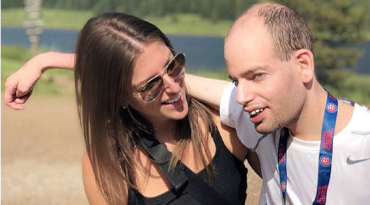Our series of articles for Jewish Disability Awareness and Inclusion Month continue with this blog from Karen Klass, a sibling of a Keshet participant. Karen is currently a lawyer at Latham & Watkins and also serves on the Keshet Junior Board Executive Committee.
A constant headline we see across our news outlets is how polarized our country is. We have a divided government, divided voters, and divided values. One thing everyone seems to agree on is that it would help us all if we could only come together. To me, togetherness requires people to accept one another and strive for inclusion. This only works if we look at people who are different from us and accept them for who they are.
My older brother, Ira, has intellectual disabilities and needs a great deal of help in his every day life. However, I have never looked at Ira as being “different.” As a younger sister, Ira was just my big brother. Yes, he flapped his hands to show he was excited, and he didn’t use words to communicate, but that is just Ira and I’ve always adored him exactly the way he is.
As I’ve grown older, I’ve gotten to see something really special. I’ve had the chance to see Ira through the lens of my friends and colleagues who had never met someone with special needs before. People certainly have questions about why Ira is the way he is, but each person I’ve introduced to my brother has walked away with a smile on their face. Many of my closest friends didn’t stop at just meeting Ira and his friends, but they felt compelled to dedicate their time, efforts, and passion toward serving on the Keshet Junior Board, which recently raised over $50,000 at our last event. It’s an understatement for me to say that I am proud to be Ira Klass’s little sister.
The positivity I feel toward my brother, his life, and his opportunities, would not be where it is today if it was not for Keshet. The staff, participants, and families of Keshet embody inclusion in their daily lives. Keshet teaches others to be proud of people for their abilities, rather than dwelling on their disabilities, and allows us to understand that success and happiness can take place in so many different forms.
As much as I work to include my brother in my “mainstream” community, he really demonstrates inclusion more than I do. Ira and his friends don’t analyze people based on the color of their skin or their political beliefs. They have taught me how to simply love other people without judgment. For all of these reasons and so many more, I am the one who is lucky to be included in Ira’s world.

